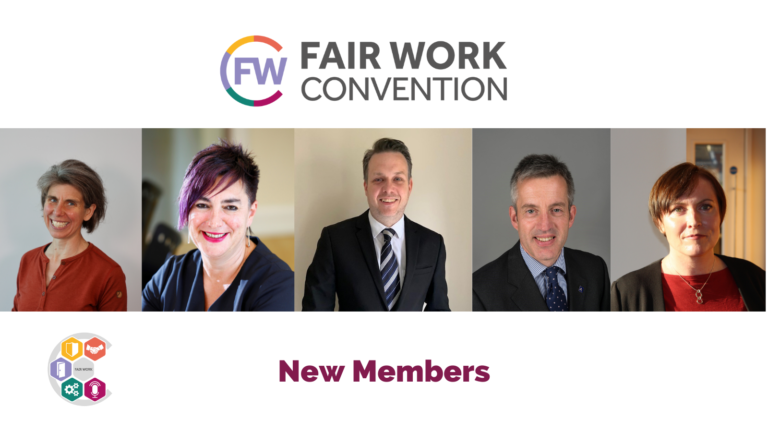
The Fair Work Convention has welcomed five new members bringing a range of skills and experience to meet key challenges ahead. Fair work is crucial if Scotland is going to respond effectively to the pandemic and the climate emergency, to achieve its ambition to reduce inequality and child poverty, and be a country where all can contribute and benefit.
The new members of the Fair Work Convention come from a variety backgrounds across the public, private, voluntary sectors and Scotland’s trade unions, bringing with them an unparalleled collective understanding of Scotland’s workplaces and labour market and a commitment to fair work and high quality, innovative work practice. The new members are
- Aileen McLeod, Director of Business Planning and Commercial for Scottish and Southern Energy Networks (SSE) who brings a passion not only for fair work but for issues around sustainability and the need for Scotland to respond effectively to the climate emergency.
- Anna Fowlie, Chief Executive, Scottish Council of Voluntary Organisations (SCVO) who brings with her a drive to support Scotland’s communities and to address poverty and inequality.
- Chris Westcott, HR Director – Europe & Asia within the Health Sector for Johnson Matthey who brings an international human resources perspective alongside extensive experience of supporting workplace cultural change and enabling employee-led productivity improvement.
- Jim Savege, Chief Executive, Aberdeenshire Council who brings extensive experience from local government and an important perspective from the North East of Scotland.
- Roz Foyer, General Secretary of the Scottish Trades Union Congress (STUC) who brings with her a passion for fair work and improving outcomes for workers across the economy.
They will join existing Fair Work Convention members to promote and advocate fair work and advise ministers including newly appointed Minister for Just Transition, Employment and Fair Work, Richard Lochhead.
The Fair Work Convention has made a number of recommendations to the Scottish Government on how fair work should be advanced. These include:
- making fair work a condition of all public funding and public contracts awarded to employers as a means of improving and embedding fair work standards,
- using the powers of the Scottish Parliament to improve the safety net for workers with a specific focus on sick pay and unemployment support,
- taking action to improve the experience of fair work for disabled workers, ethnic minority workers, women, younger workers, older workers and LGBT+ workers;
- expanding collective bargaining coverage in sectors such as childcare, construction and hospitality; and
- rapidly implementing in full the recommendations of the Convention’s landmark social care inquiry to deal with the pressures in social care caused by the pandemic by providing a clear route-map for improving terms and conditions, embedding worker voice and supporting better outcomes for workers, employers and service users.
Richard Lochhead, Minister for Just Transition, Employment and Fair Work said:
“These five new members bring a wealth of talent and knowledge to the Fair Work Convention and I look forward to looking closely with them.
Fair Work will be key to Scotland’s economic transformation and just transition to net zero and the Convention will provide valuable advice and guidance on fulfilling our Fair Work commitments.”
Professor Patricia Findlay, Co-Chair of the Fair Work Convention, said:
“Fair Work is key to creating productive and innovative workplaces that deliver worker wellbeing. The pandemic, Brexit and the climate emergency only serve to underline the urgency of making fair work a reality for all
The Convention is clear that there remains much to do if we are to achieve the collective vision of Scotland becoming a Fair Work nation by 2025. We are delighted to welcome our new members to the Convention. They will bring considerable insight and support Scotland’s journey to becoming a Fair Work Nation.”
Grahame Smith Co-Chairs, Fair Work Convention, added
“Fair Work has never been an optional extra. The Convention’s work has exposed a high level of variation in access to fair work by sector and by gender, age, race and disability. As the economy recovers from the pandemic it is important to focus on fair work, creating high quality jobs and addressing longstanding inequalities that exist in our labour market.
I look forward to working with our new Convention members. The different perspectives they offer, drawn for a breadth and depth of workplace experience, will greatly complement that of our existing members.
The challenges faced in our economy and society demand strong leadership. We have that in abundance within the Convention which stands us in good stead given the challenges we face in making fair work a reality in all of Scotland’s workplaces.”
